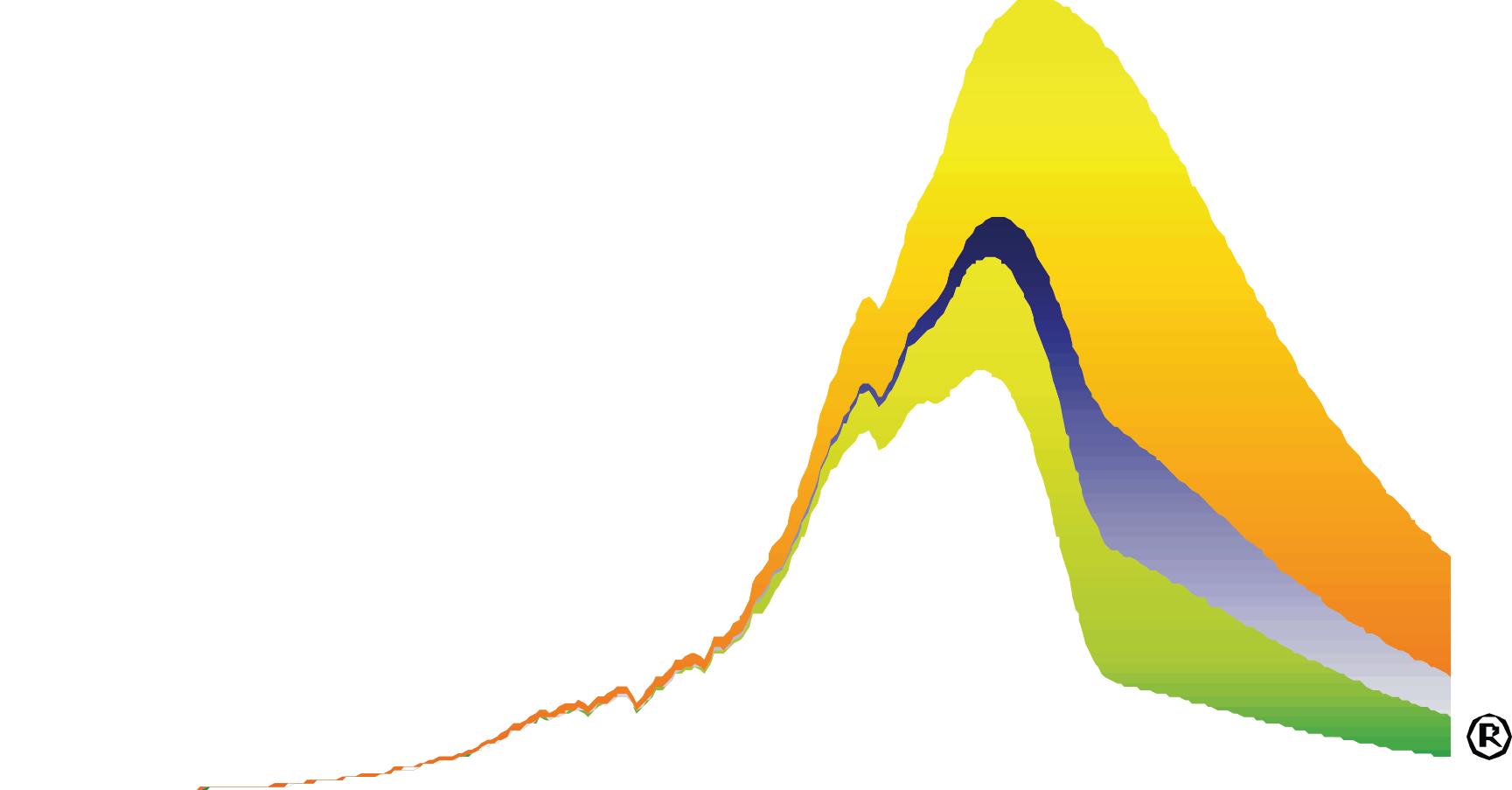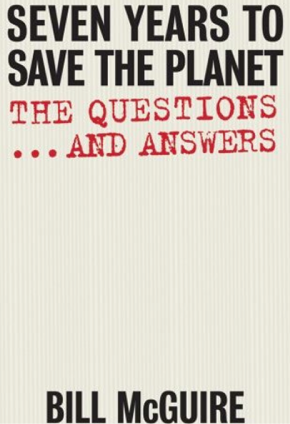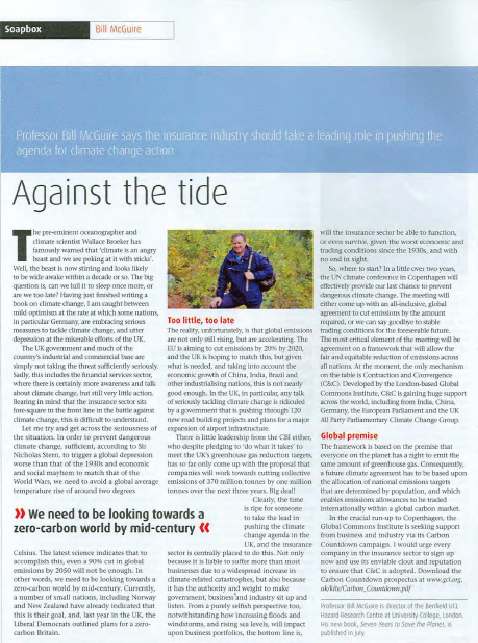Professor Bill McGuire
 Click logo to return to 'links-page'
Click logo to return to 'links-page'
Dear Aubrey
I can confirm that I wholeheartedly support the GCI's contraction and convergence proposal to the UNFCCC.
Please do add my name and affiliation to the list.
UNFCCC Submission
Signatory List
Bill McGuire
Professor of Geophysical & Climate Hazards
Dept of Earth Sciences
Faculty of Maths & Physical Sciences

"There is a way of cutting global greenhouse gas emissions that is equitable, sensible and workable. It is called Contraction & Convergence, or simply C&C.
It is the brainchild of the South African musician Aubrey Meyer, founder of the London-based Global Commons Institute.
Meyer grasped the urgency of finding a viable solution to climate change earlier than most of us realised that there was a problem."
Seven Years to Save the Planet
Bill McGuire on C&C

So, where to start?
In a little over two years, the UN climate conference in Copenhagen will effectively provide our last chance to prevent dangerous climate change.
The meeting will either come up with an all·inclusive, global agreement to rut emissions by the amount required,
or we can say goodbye to stable trading conditions for the fo reseeable future.
The most critical element of the meeting will be agreement on a framework,
that will allow the fair and equitable reduction of emissions across all nations.
At the moment, the only mechanism on the table is Contraction and Convergence (C&C).
Developed by the London-based Global Commons lnstitute, C&C is gaining huge support across the world,
including from India, China, Germany, the European Parliament and the UK All Party Parliamentary Climate Change Group.
Global premise - The framework is based on the premise that everyone on the planet has a right to emit the same amount of greenhouse gas.
Consequently, a future climate agreement has to be based upon the allocation of national emissions targets that are determined by population,
and which enables emissions a!lowances to be traded internationally within a global carbon market.
In the crucial run-up to Copenhagen, the Global Commons Institute is seeking support from business and industry via its Carbon Countdown campaign.
I would urge every company in the insurance sector to sign up now and use its enviable clout and reputation to ensure that C&C is adopted.
Download the Carbon Countdown prospectus.
Against the Tide Bill McGuire in 'the Actuary' October 2008
Professor Bill McGuire -
"GCI's brilliant CBAT visualization tool sidesteps wishful thinking & provides a sharp does of reality. I urge all to use & promote it."
The failure of IPCC5 and the [UKMO's] UK Climate Act to address the critical issue of carbon feedbacks,
particularly in relation to methane release
as a consequence of permafrost thawing, is both disappointing and dangerous.
By effectively setting the likely consequences of such feedback effects at zero, future temperature projections are minimised,
so pandering to those who wish to play down the level of warming we can expect and reducing the perceived impact of climate change down the line.
By separating out the effects of human-induced and feedback-related emissions, the GCI's brilliant CBAT visualisation tool
sidesteps the wishful thinking and provides a sharp dose of reality.
I urge all who wish to view a true picture of how climate change will transform our world as the century progresses to use it and promote it.
Bill McGuire Professor of Geophysical & Climate Hazards,
University College London [UCL]
Director UCL's Aon Benfield UCL Hazard Centre [1997 2010]
Bill McGuire is – by inclination and training – a volcanologist, and has worked on and visited volcanoes across the world.
In 1996 he occupied a post of Senior Scientist at the Montserrat Volcano Observatory at a time of escalating activity
and the first explosive eruption at the Soufriere Hills volcano.
He currently holds the posts of Benfield Professor of Geophysical Hazards and Director of the Benfield Hazard Research Centre at University College London.
The BHRC hosts over 50 core researchers and affiliates and is the largest academic hazard centre in Europe.
Bill’s principal research interests are volcano monitoring and volcanic hazards and global geophysical catastrophes and their impacts.
He is also qualified to provide expert comment on a range of other natural hazards, including earthquakes, landslides, and the hazard implications of climate change.
He is a staunch supporter of an anthropogenic cause for global warming and an evangelical advocate of the importance of drastic cuts
in greenhouse gas emissions to mitigate a more climatically hazardous future.
Bill has been the UK’s representative of the International Association of Volcanology and Chemistry of the Earth’s Interior,
Secretary of UK Panel of the International Union of Geodesy & Geophysics, and a Council Member of the Geological Society.
He is a Fellow of the Geological Society and of the Royal Institution, and is a member of the Royal Institution’s Science Media Panel.
Bill was also a member of the UK Government’s Natural Hazard Working Group, established by Prime Minister Tony Blair following the 2004 Indian Ocean tsunami.
Bill is author of over three hundred books articles and papers. His current academic work, the World Atlas of Natural Hazards was published by Hodder Arnold
in August 2004 and his new popular science books, Surviving Armageddon: Solution for a Threatened Planet, and Global Catastrophes:
a Very Short Introduction, were published by OUP in – respectively – June 2005 and January 2006.
Bill is a member of the Association of British Sciences Writers and a regular contributor to radio, television, and the press on hazard-related matters.
He presented the BBC Radio 4 series Disasters in Waiting and Scientists Under Pressure.Bill lives in Hampton with his wife Anna, 5-year old son,
and cats Jetsam, Driftwood, and Dave.
